Yamaha YZFR6X, YZFR6XC User Manual
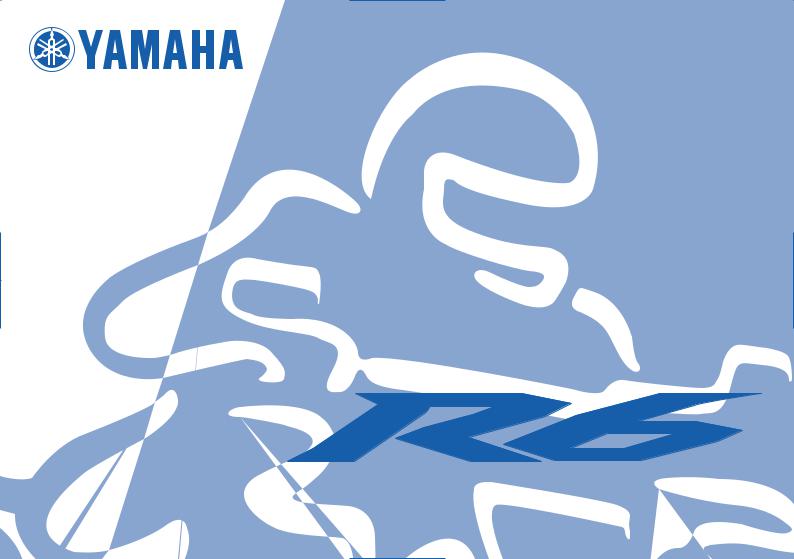
OWNER’S MANUAL
YZFR6X(C)
LIT-11626-21-61 |
13S-28199-10 |
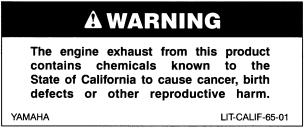
EAU10041

INTRODUCTION
EAU10080
Congratulations on your purchase of the Yamaha YZFR6X(C). This model is the result of Yamaha’s vast experience in the production of fine sporting, touring, and pacesetting racing machines. It represents the high degree of craftsmanship and reliability that have made Yamaha a leader in these fields.
This manual will give you an understanding of the operation, inspection, and basic maintenance of this motorcycle. If you have any questions concerning the operation or maintenance of your motorcycle, please consult a Yamaha dealer.
The design and manufacture of this Yamaha motorcycle fully comply with the emissions standards for clean air applicable at the date of manufacture. Yamaha has met these standards without reducing the performance or economy of operation of the motorcycle. To maintain these high standards, it is important that you and your Yamaha dealer pay close attention to the recommended maintenance schedules and operating instructions contained within this manual.
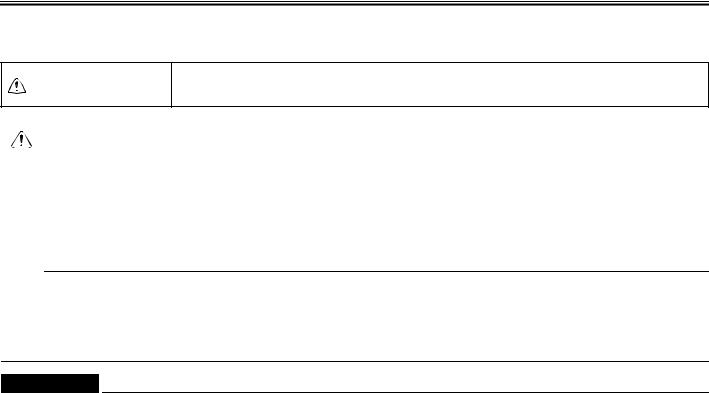
IMPORTANT MANUAL INFORMATION
EAU10131
Particularly important information is distinguished in this manual by the following notations:
The Safety Alert Symbol means ATTENTION! BECOME ALERT! YOUR SAFETY IS
INVOLVED!
|
|
|
|
Failure to follow WARNING instructions could result in severe injury or death to the |
|
WARNING |
|
motorcycle operator, a bystander or a person inspecting or repairing the motor- |
|
|
|
|
|
cycle. |
|
|
|
|
|
|
|
|
|
|
|
|
|
|
A CAUTION indicates special precautions that must be taken to avoid damage to |
|
CAUTION: |
|
|
|
|
|
the motorcycle. |
||
|
|
|
|
|
|
|
|
|
|
|
|
|
|
|
|
NOTE: |
A NOTE provides key information to make procedures easier or clearer. |
||
|
|
|
|
|
NOTE:
●This manual should be considered a permanent part of this motorcycle and should remain with it even if the motorcycle is subsequently sold.
●Yamaha continually seeks advancements in product design and quality. Therefore, while this manual contains the most current product information available at the time of printing, there may be minor discrepancies between your motorcycle and this manual. If you have any questions concerning this manual, please consult your Yamaha dealer.
EWA10010
 WARNING
WARNING
PLEASE READ THIS MANUAL AND THE “YOU AND YOUR MOTORCYCLE: RIDING TIPS” BOOKLET CAREFULLY AND COMPLETELY BEFORE OPERATING THIS MOTORCYCLE. DO NOT ATTEMPT TO OPERATE THIS MOTORCYCLE UNTIL YOU HAVE ATTAINED ADEQUATE KNOWLEDGE OF ITS CONTROLS AND OPERATING FEATURES

IMPORTANT MANUAL INFORMATION
AND UNTIL YOU HAVE BEEN TRAINED IN SAFE AND PROPER RIDING TECHNIQUES. REGULAR INSPECTIONS AND CAREFUL MAINTENANCE, ALONG WITH GOOD RIDING SKILLS, WILL ENSURE THAT YOU SAFELY ENJOY THE CAPABILITIES AND THE RELIABILITY OF THIS MOTORCYCLE.
*Product and specifications are subject to change without notice.
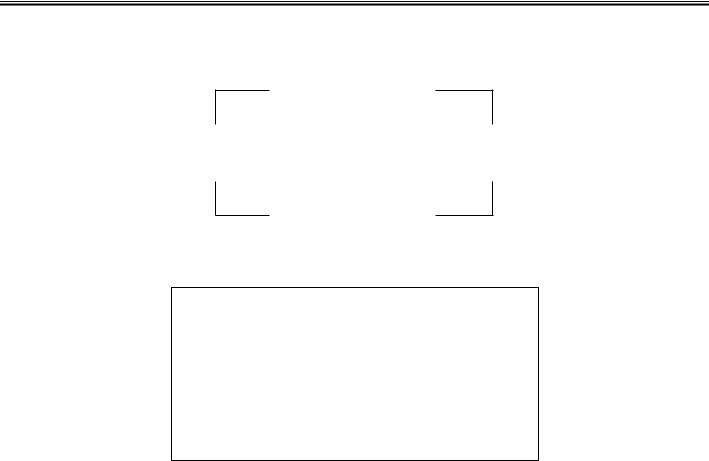
IMPORTANT MANUAL INFORMATION
EAU10192
AFFIX DEALER
LABEL HERE
YZFR6X(C)
OWNER’S MANUAL
©2007 by Yamaha Motor Corporation, U.S.A. 1st edition, August 2007
All rights reserved.
Any reprinting or unauthorized use without the written permission of Yamaha Motor Corporation, U.S.A. is expressly prohibited.
Printed in Japan.
P/N LIT-11626-21-61

TABLE OF CONTENTS
SAFETY INFORMATION .................. |
1-1 |
Location of important labels ........... |
1-5 |
DESCRIPTION .................................. |
2-1 |
Left view .......................................... |
2-1 |
Right view ........................................ |
2-2 |
Controls and instruments ................ |
2-3 |
INSTRUMENT AND CONTROL |
|
FUNCTIONS....................................... |
3-1 |
Main switch/steering lock ................ |
3-1 |
Indicator and warning lights ............ |
3-2 |
Multi-function meter unit ................. |
3-5 |
Handlebar switches ...................... |
3-11 |
Clutch lever .................................. |
3-12 |
Shift pedal .................................... |
3-12 |
Brake lever ................................... |
3-12 |
Brake pedal .................................. |
3-13 |
Fuel tank cap ................................ |
3-13 |
Fuel .............................................. |
3-14 |
Catalytic converters ...................... |
3-15 |
Seats ............................................ |
3-15 |
Helmet holding cable .................... |
3-17 |
Adjusting the front fork ................. |
3-18 |
Adjusting the shock absorber |
|
assembly ................................... |
3-20 |
Luggage strap holders .................. |
3-22 |
EXUP system ............................... |
3-23 |
Sidestand ..................................... |
3-23 |
Ignition circuit cut-off system ........ |
3-24 |
PRE-OPERATION CHECKS ............. |
4-1 |
Pre-operation check list ................. |
4-2 |
OPERATION AND IMPORTANT |
|
RIDING POINTS ................................ |
5-1 |
Starting the engine ......................... |
5-1 |
Shifting ........................................... |
5-2 |
Engine break-in .............................. |
5-3 |
Parking ........................................... |
5-4 |
PERIODIC MAINTENANCE AND |
|
MINOR REPAIR................................. |
6-1 |
PERIODIC MAINTENANCE .......... |
6-1 |
Owner’s tool kit .............................. |
6-1 |
Periodic maintenance chart for |
|
the emission control system ....... |
6-3 |
General maintenance and |
|
lubrication chart .......................... |
6-4 |
Removing and installing cowlings |
|
and panels .................................. |
6-9 |
Checking the spark plugs ............ |
6-13 |
Canister (for California only) ........ |
6-14 |
Engine oil and oil filter cartridge ... |
6-14 |
Coolant ........................................ |
6-18 |
Air filter element ........................... |
6-21 |
Checking the engine idling |
|
speed ........................................ |
6-21 |
Checking the throttle cable free |
|
play ........................................... |
6-22 |
Valve clearance ........................... |
6-22 |
Tires ............................................. |
6-22 |
Cast wheels .................................. |
6-25 |
Accessories and replacement |
|
parts .......................................... |
6-25 |
Adjusting the clutch lever free |
|
play ........................................... |
6-26 |
Adjusting the rear brake light |
|
switch ........................................ |
6-27 |
Checking the front and rear |
|
brake pads ................................ |
6-27 |
Checking the brake fluid level ...... |
6-28 |
Changing the brake fluid .............. |
6-29 |
Drive chain slack .......................... |
6-29 |
Cleaning and lubricating |
|
the drive chain .......................... |
6-31 |
Checking and lubricating |
|
the cables ................................. |
6-32 |
Checking and lubricating |
|
the throttle grip and cable ......... |
6-32 |
Checking and lubricating |
|
the brake and shift pedals ......... |
6-32 |
Checking and lubricating |
|
the brake and clutch levers ....... |
6-33 |
Checking and lubricating |
|
the sidestand ............................ |
6-34 |
Lubricating the swingarm pivots ... |
6-34 |
Checking the front fork ................. |
6-34 |
Checking the steering .................. |
6-35 |
Checking the wheel bearings ....... |
6-36 |
Battery .......................................... |
6-36 |
Replacing the fuses ...................... |
6-37 |
Replacing a headlight bulb ........... |
6-38 |

TABLE OF CONTENTS
Tail/brake light .............................. |
6-40 |
Replacing a turn signal light |
|
bulb ........................................... |
6-40 |
Replacing the license plate light |
|
bulb ........................................... |
6-41 |
Supporting the motorcycle ............ |
6-41 |
Front wheel ................................... |
6-42 |
Rear wheel ................................... |
6-44 |
Troubleshooting ............................ |
6-46 |
Troubleshooting charts ................. |
6-47 |
MOTORCYCLE CARE AND |
|
STORAGE .......................................... |
7-1 |
Matte color caution ......................... |
7-1 |
Care ................................................ |
7-1 |
Storage ........................................... |
7-4 |
SPECIFICATIONS ............................. |
8-1 |
CONSUMER INFORMATION............. |
9-1 |
Identification numbers .................... |
9-1 |
Reporting safety defects ................. |
9-3 |
Motorcycle noise regulation ............ |
9-4 |
Maintenance record ........................ |
9-5 |
YAMAHA MOTOR CORPORATION, |
|
U.S.A. STREET AND ENDURO |
|
MOTORCYCLE LIMITED |
|
WARRANTY ................................ |
9-7 |
YAMAHA EXTENDED SERVICE |
|
(Y.E.S.) ........................................ |
9-9 |

 SAFETY INFORMATION
SAFETY INFORMATION
EAU10281
MOTORCYCLES ARE SINGLE TRACK VEHICLES. THEIR SAFE USE AND OPERATION ARE DEPENDENT UPON THE USE OF PROPER RIDING TECHNIQUES AS WELL AS THE EXPERTISE OF THE OPERATOR. EVERY OPERATOR SHOULD KNOW THE FOLLOWING REQUIREMENTS BEFORE RIDING THIS MOTORCYCLE.
HE OR SHE SHOULD:
●OBTAIN THOROUGH INSTRUCTIONS FROM A COMPETENT SOURCE ON ALL ASPECTS OF MOTORCYCLE OPERATION.
●OBSERVE THE WARNINGS AND MAINTENANCE REQUIREMENTS IN THE OWNER’S MANUAL.
●OBTAIN QUALIFIED TRAINING IN SAFE AND PROPER RIDING TECHNIQUES.
●OBTAIN PROFESSIONAL TECHNICAL SERVICE AS INDICATED BY THE OWNER’S MANUAL
AND/OR WHEN MADE NECESSARY BY MECHANICAL CONDITIONS.
Safe riding
●Always make pre-operation checks. Careful checks may help prevent an accident.
●This motorcycle is designed to carry the operator and a passenger.
●The failure of motorists to detect and recognize motorcycles in traffic is the predominating cause of automobile/motorcycle accidents. Many accidents have been caused by an automobile driver who did not see the motorcycle. Making yourself conspicuous appears to be very effective in reducing the chance of this type of accident.
Therefore:
•Wear a brightly colored jacket.
•Use extra caution when you are approaching and passing through intersections, since intersections are the most likely places for motorcycle accidents to occur.
•Ride where other motorists can see you. Avoid riding in another motorist’s blind spot.
● Many accidents involve inexperi- 1 enced operators. In fact, many operators who have been involved in accidents do not even have a current motorcycle license.
•Make sure that you are qualified and that you only lend your motorcycle to other qualified operators.
•Know your skills and limits. Staying within your limits may help you to avoid an accident.
•We recommend that you practice riding your motorcycle where there is no traffic until you have become thoroughly familiar with the motorcycle and all of its controls.
●Many accidents have been caused by error of the motorcycle operator. A typical error made by the operator is veering wide on a turn
1-1

 SAFETY INFORMATION
SAFETY INFORMATION
due to EXCESSIVE SPEED or undercornering (insufficient lean angle for the speed).
1• Always obey the speed limit and never travel faster than warranted by road and traffic conditions.
•Always signal before turning or changing lanes. Make sure that other motorists can see you.
●The posture of the operator and passenger is important for proper control.
•The operator should keep both hands on the handlebar and both feet on the operator footrests during operation to maintain control of the motorcycle.
•The passenger should always hold onto the operator, the seat strap or grab bar, if equipped, with both hands and keep both feet on the passenger footrests.
•Never carry a passenger unless he or she can firmly place both feet on the passenger footrests.
●Never ride under the influence of alcohol or other drugs.
●This motorcycle is designed for onroad use only. It is not suitable for off-road use.
Protective apparel
The majority of fatalities from motorcycle accidents are the result of head injuries. The use of a safety helmet is the single most critical factor in the prevention or reduction of head injuries.
●Always wear an approved helmet.
●Wear a face shield or goggles. Wind in your unprotected eyes could contribute to an impairment of vision that could delay seeing a hazard.
●The use of a jacket, heavy boots, trousers, gloves, etc., is effective in preventing or reducing abrasions or lacerations.
●Never wear loose-fitting clothes, otherwise they could catch on the control levers, footrests, or wheels and cause injury or an accident.
●Never touch the engine or exhaust system during or after operation. They become very hot and can
cause burns. Always wear protective clothing that covers your legs, ankles, and feet.
●A passenger should also observe the above precautions.
Modifications
Modifications made to this motorcycle not approved by Yamaha, or the removal of original equipment, may render the motorcycle unsafe for use and may cause severe personal injury. Modifications may also make your motorcycle illegal to use.
Loading and accessories
Adding accessories or cargo to your motorcycle can adversely affect stability and handling if the weight distribution of the motorcycle is changed. To avoid the possibility of an accident, use extreme caution when adding cargo or accessories to your motorcycle. Use extra care when riding a motorcycle that has added cargo or accessories. Here are some general guidelines to follow if loading cargo or adding accessories to your motorcycle:
1-2

 SAFETY INFORMATION
SAFETY INFORMATION
Loading
The total weight of the operator, passenger, accessories and cargo must not exceed the maximum load limit.
Maximum load:
YZFR6X 190 kg (419 lb)
YZFR6XC 189 kg (417 lb)
When loading within this weight limit, keep the following in mind:
●Cargo and accessory weight should be kept as low and close to the motorcycle as possible. Make sure to distribute the weight as evenly as possible on both sides of the motorcycle to minimize imbalance or instability.
●Shifting weights can create a sudden imbalance. Make sure that accessories and cargo are securely attached to the motorcycle before riding. Check accessory mounts and cargo restraints frequently.
●Never attach any large or heavy items to the handlebar, front fork, or front fender. These items, including such cargo as sleeping
bags, duffel bags, or tents, can create unstable handling or a slow steering response.
Accessories
Genuine Yamaha accessories have been specifically designed for use on this motorcycle. Since Yamaha cannot test all other accessories that may be available, you must personally be responsible for the proper selection, installation and use of non-Yamaha accessories. Use extreme caution when selecting and installing any accessories.
Keep the following guidelines in mind, as well as those provided under “Loading” when mounting accessories.
●Never install accessories or carry cargo that would impair the performance of your motorcycle. Carefully inspect the accessory before using it to make sure that it does not in any way reduce ground clearance or cornering clearance,
limit suspension travel, steering travel or control operation, or obscure lights or reflectors.
• Accessories fitted to the handle- 1 bar or the front fork area can create instability due to improper weight distribution or aerodynamic changes. If accessories
are added to the handlebar or front fork area, they must be as lightweight as possible and should be kept to a minimum.
•Bulky or large accessories may seriously affect the stability of the motorcycle due to aerodynamic effects. Wind may attempt to lift the motorcycle, or the motorcycle may become unstable in cross winds. These accessories may also cause instability when passing or being passed by large vehicles.
•Certain accessories can displace the operator from his or her normal riding position. This improper position limits the freedom of movement of the opera-
1-3

 SAFETY INFORMATION
SAFETY INFORMATION
tor and may limit control ability, therefore, such accessories are not recommended.
1 ● Use caution when adding electrical accessories. If electrical accessories exceed the capacity of the motorcycle’s electrical system, an electric failure could result, which could cause a dangerous loss of lights or engine power.
Gasoline and exhaust gas
●GASOLINE IS HIGHLY FLAMMABLE:
•Always turn the engine off when refueling.
•Take care not to spill any gasoline on the engine or exhaust system when refueling.
•Never refuel while smoking or in the vicinity of an open flame.
●Never start the engine or let it run for any length of time in a closed area. The exhaust fumes are poisonous and may cause loss of consciousness and death within a short time. Always operate your motorcycle in an area that has adequate ventilation.
●Always turn the engine off before leaving the motorcycle unattended and remove the key from the main switch. When parking the motorcycle, note the following:
•The engine and exhaust system may be hot, therefore, park the motorcycle in a place where pedestrians or children are not likely to touch these hot areas.
•Do not park the motorcycle on a slope or soft ground, otherwise it may fall over.
•Do not park the motorcycle near a flammable source, (e.g., a kerosene heater, or near an open flame), otherwise it could catch fire.
●When transporting the motorcycle in another vehicle, make sure that it is kept upright. If the motorcycle should lean over, gasoline may leak out of the fuel tank.
●If you should swallow any gasoline, inhale a lot of gasoline vapor, or allow gasoline to get into your eyes, see your doctor immediately. If any gasoline spills on your skin
or clothing, immediately wash the affected area with soap and water and change your clothes.
1-4
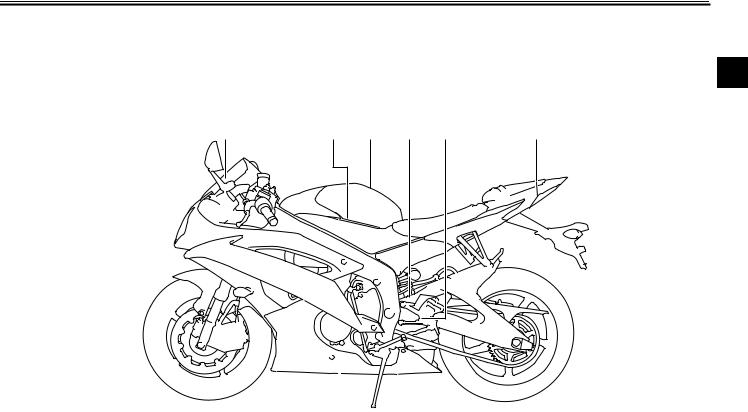
 SAFETY INFORMATION
SAFETY INFORMATION
EAU10381
Location of important labels
Please read the following important labels carefully before operating this vehicle.
1
1 |
2,3,4 |
5 |
6 |
7 |
8,9 |
1-5
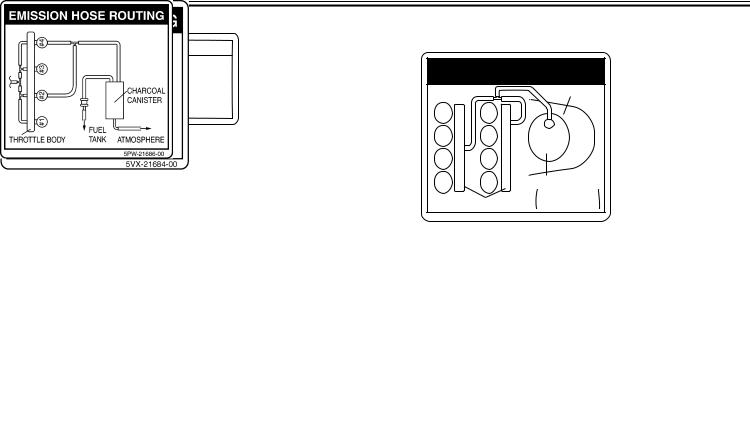
 SAFETY INFORMATION
SAFETY INFORMATION
1 CAUTION
 Cleaning with alkaline or 1 acid cleaner, gasoline or
Cleaning with alkaline or 1 acid cleaner, gasoline or
solvent will damage windshield.
Use neutral detergent.
5JW-00
2 California only
1
3 California only
HOW TO LAYOUT FUEL HOSES
FUEL TANK
#4-2 |
#4-1 |
#3-2 |
#3-1 |
#2-2 |
#2-1 |
#1-2 |
#1-1 |
|
FUEL PUMP |
FUEL FILTER
FUEL DELIVERY PRESS. REGULATOR
13S-2178A-00
4 California only
1-6
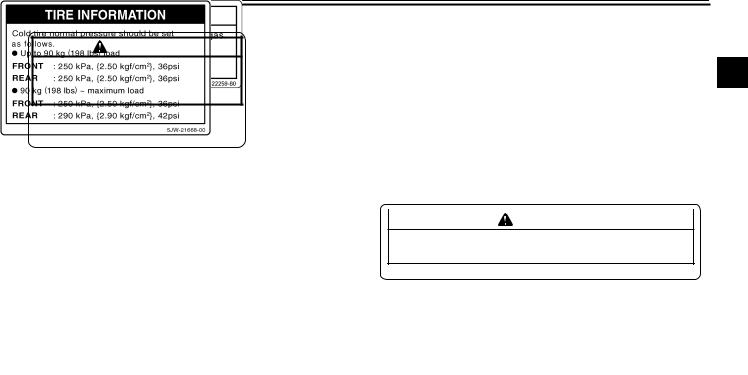
 SAFETY INFORMATION
SAFETY INFORMATION
5 |
WARNING |
7 |
 BEFORE YOU OPERATE THIS VEHICLE, READ
BEFORE YOU OPERATE THIS VEHICLE, READ
THE OWNER’S MANUAL AND ALL LABELS. 1  ALWAYS WEAR AN APPROVED MOTORCYCLE
ALWAYS WEAR AN APPROVED MOTORCYCLE
HELMET, eye protection, and protectibe clothing.
|
PREMIUM UNLEADED GASOLINE ONLY |
|
|
290 kPa, {2.90 kgf/cm2}, 42psi |
|
|
|
|
|
|
|
|
91 Min. Pump Octane (R+M)/2 |
|
|
|
|
|
4C8-2118K-00 |
|
|
|
|
|
|
|
|
5VY-21668-00 |
|
6 |
8 |
|
|
|
|
|
WARNING |
||||
|
|
|
|
||
Improper loading can cause loss of control.
Read owner’s manual for proper loading.
3JJ-28446-A1
9
3 kg {7 lbs}
1-7
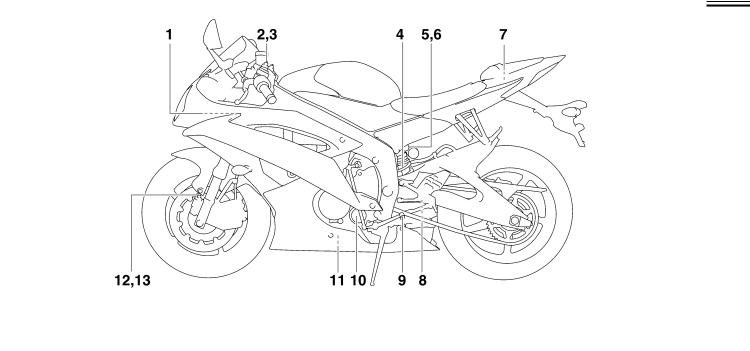
DESCRIPTION
Left view
2
1.Fuse box 2 (page 6-37)
2.Front fork spring preload adjusting bolt (page 3-18)
3.Front fork rebound damping force adjusting screw (page 3-18)
4.Shock absorber assembly spring preload adjusting ring (page 3-20)
5.Shock absorber assembly compression damping force adjusting bolt (for fast compression damping) (page 3-20)
6.Shock absorber assembly compression damping force adjusting bolt (for slow compression damping) (page 3-20)
7.Owner’s tool kit (page 6-1)
EAU10410
8.Shock absorber assembly rebound damping force adjusting screw (page 3-20)
9.Shift pedal (page 3-12)
10.Engine oil filter cartridge (page 6-14) 11.Engine oil drain bolt (page 6-14)
12.Front fork compression damping force adjusting bolt (for fast compression damping) (page 3-18)
13.Front fork compression damping force adjusting bolt (for slow compression damping) (page 3-18)
2-1
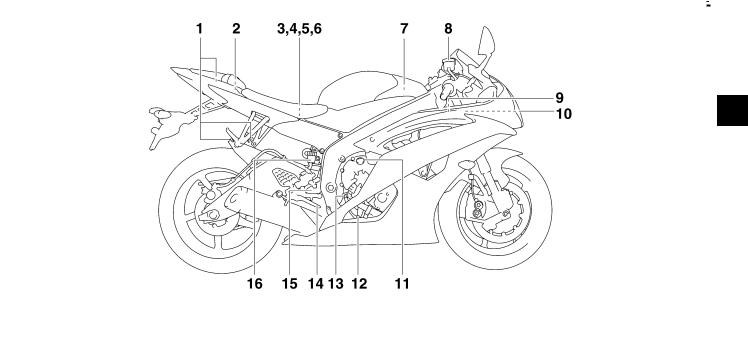
DESCRIPTION
EAU10420
Right view
2
1.Luggage strap holder (page 3-22)
2.Helmet holder (page 3-17)
3.Fuse box 1 (page 6-37)
4.Main fuse (page 6-37)
5.Fuel injection system fuse (page 6-37)
6.Battery (page 6-36)
7.Air filter element (page 6-21)
8.Front brake fluid reservoir (page 6-28)
9. Radiator cap (page 6-18) 10.Coolant reservoir (page 6-18) 11.Engine oil filler cap (page 6-14) 12.Coolant drain bolt (page 6-19) 13.Engine oil dipstick (page 6-14) 14.Brake pedal (page 3-13)
15.Rear brake light switch (page 6-27) 16.Rear brake fluid reservoir (page 6-28)
2-2
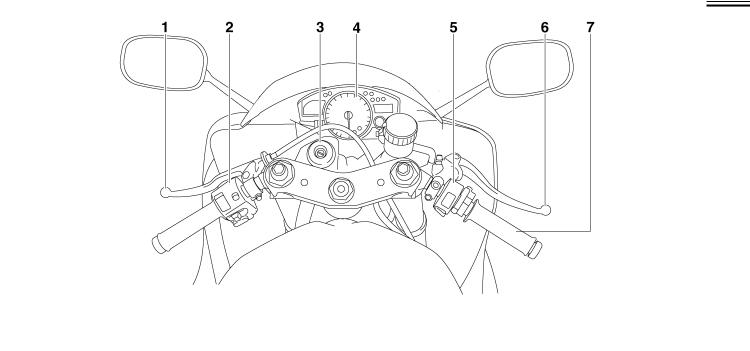
DESCRIPTION
EAU10430
Controls and instruments
2
1.Clutch lever (page 3-12)
2.Left handlebar switches (page 3-11)
3.Main switch/steering lock (page 3-1)
4.Multi-function meter unit (page 3-5)
5.Right handlebar switches (page 3-11)
6.Brake lever (page 3-12)
7.Throttle grip (page 6-22)
2-3
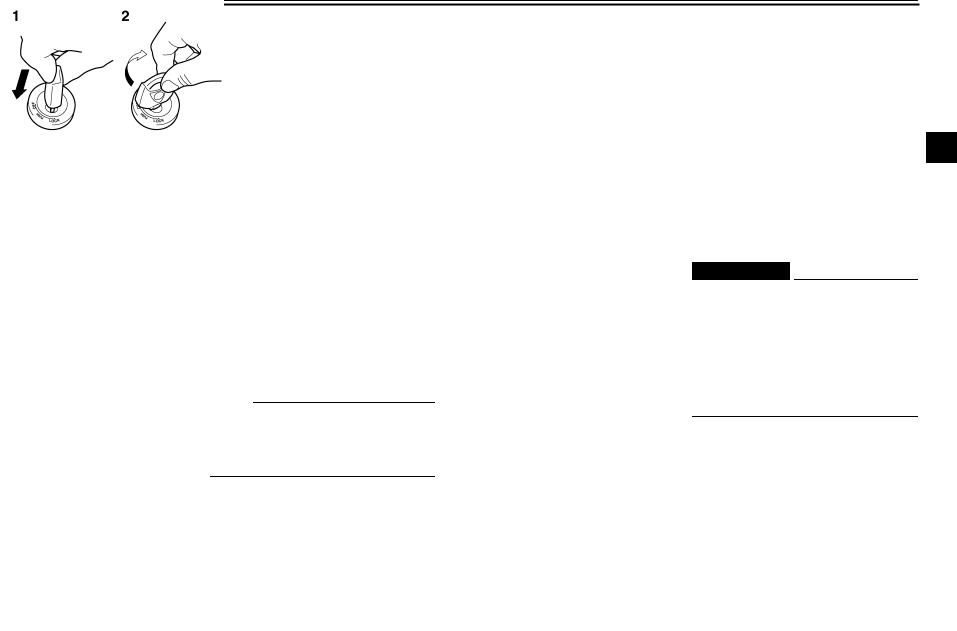
INSTRUMENT AND CONTROL FUNCTIONS
EAU10460 |
EAU10660 |
Main switch/steering lock |
OFF |
|
All electrical systems are off. The key |
|
can be removed. |
|
EAU10680 |
|
LOCK |
|
The steering is locked, and all electrical |
|
systems are off. The key can be re- |
|
moved. |
|
To lock the steering |
The main switch/steering lock controls the ignition and lighting systems, and is used to lock the steering. The various positions are described below.
EAU10540
ON
All electrical circuits are supplied with power, and the meter lighting, taillight, license plate light and position lights come on, and the engine can be started. The key cannot be removed.
NOTE:
The headlight comes on automatically when the engine is started and stays on until the key is turned to “OFF”, even if the engine stalls.
1.Push.
2.Turn.
1.Turn the handlebars all the way to the left.
2.Push the key in from the “OFF” position, and then turn it to “LOCK” while still pushing it.
3.Remove the key.
To unlock the steering
3
1.Push.
2.Turn.
Push the key in, and then turn it to “OFF” while still pushing it.
EWA10060
 WARNING
WARNING
Never turn the key to “OFF” or “LOCK” while the vehicle is moving, otherwise the electrical systems will be switched off, which may result in loss of control or an accident. Make sure that the vehicle is stopped before turning the key to “OFF” or “LOCK”.
3-1
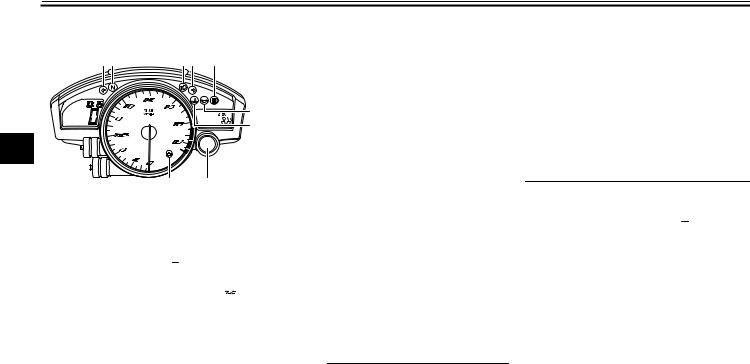
INSTRUMENT AND CONTROL FUNCTIONS
EAU11003
Indicator and warning lights
1 2 |
3 4 |
5 |
MPH |
˚F |
6 |
TRIP A |
||
|
|
7 |
3
9 8
1.Left turn signal indicator light “ ”
”
2.Neutral indicator light “  ”
”
3.High beam indicator light “  ”
”
4.Right turn signal indicator light “ ”
”
5.Fuel level warning light “ ”
”
6.Oil level warning light “ 

 ”
”
7.Coolant temperature warning light “  ”
”
8.Shift timing indicator light
9.Engine trouble warning light “  ”
”
EAU11030
Turn signal indicator lights “ ” and “
” and “ ”
”
The corresponding indicator light flashes when the turn signal switch is pushed to the left or right.
EAU11060
Neutral indicator light “ ”
”
This indicator light comes on when the transmission is in the neutral position.
EAU11080
High beam indicator light “ ”
”
This indicator light comes on when the high beam of the headlight is switched on.
EAU11250
Oil level warning light “

 ”
”
This warning light comes on when the engine oil level is low.
The electrical circuit of the warning light can be checked by turning the key to “ON”.
If the warning light does not come on for a few seconds, then go off, have a Yamaha dealer check the electrical circuit.
NOTE:
●Even if the oil level is sufficient, the warning light may flicker when riding on a slope or during sudden acceleration or deceleration, but this is not a malfunction.
●This model is also equipped with a self-diagnosis device for the oil level detection circuit. If the oil level detection circuit is defective, the following cycle will be repeated until the malfunction is corrected: The oil level warning light will flash ten times, then go off for 2.5 seconds. If this occurs, have a Yamaha dealer check the vehicle.
EAU11361
Fuel level warning light “ ”
”
This warning light comes on when the fuel level drops below approximately 3.5 L (0.92 US gal) (0.77 Imp.gal). When this occurs, refuel as soon as possible.
The electrical circuit of the warning light can be checked by turning the key to “ON”.
If the warning light does not come on for a few seconds, and then go off, have a Yamaha dealer check the electrical circuit.
3-2

INSTRUMENT AND CONTROL FUNCTIONS
NOTE:
This model is also equipped with a selfdiagnosis device for the fuel level detection circuit. If the fuel level detection circuit is defective, the following cycle will be repeated until the malfunction is corrected: The fuel level warning light will flash eight times, and then go off for 3.0 seconds. If this occurs, have a Yamaha dealer check the vehicle.
EAU11423
Coolant temperature warning light “  ”
”
This warning light comes on when the engine overheats. When this occurs, stop the engine immediately and allow the engine to cool.
The electrical circuit of the warning light can be checked by turning the key to “ON”.
If the warning light does not come on for a few seconds, then go off, have a Yamaha dealer check the electrical circuit.
ECA10020
CAUTION:
Do not operate the engine if it is overheated.
3
3-3
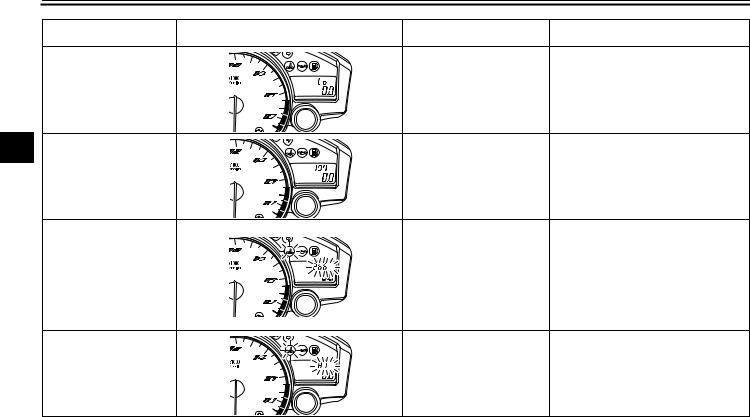
INSTRUMENT AND CONTROL FUNCTIONS
Coolant |
Display |
Conditions |
What to do |
|
temperature |
||||
|
|
|
||
Under 39 °C |
TRIP A |
˚F |
OK. Go ahead with riding. |
|
|
||||
(Under 103 °F) |
|
Message “Lo” is displayed. |
||
|
|
|
3
40–116 °C |
TRIP A |
˚F |
OK. Go ahead with riding. |
|
|||
(104–242 °F) |
|
Temperature is displayed. |
|
|
|
|
|
|
|
|
Stop the vehicle and allow it to idle until |
117–134 °C |
TRIP A |
˚F |
Temperature display flashes. |
the coolant temperature goes down. |
|
||||
(243–274 °F) |
|
|
Warning light comes on. |
If the temperature does not go down, |
|
|
|
|
stop the engine. (See page 6-47.) |
Above 135 °C (Above 275 °F)
TRIP A |
˚F |
|
Message “HI” flashes. |
Stop the engine and allow it to cool. |
Warning light comes on. |
(See page 6-47.) |
3-4
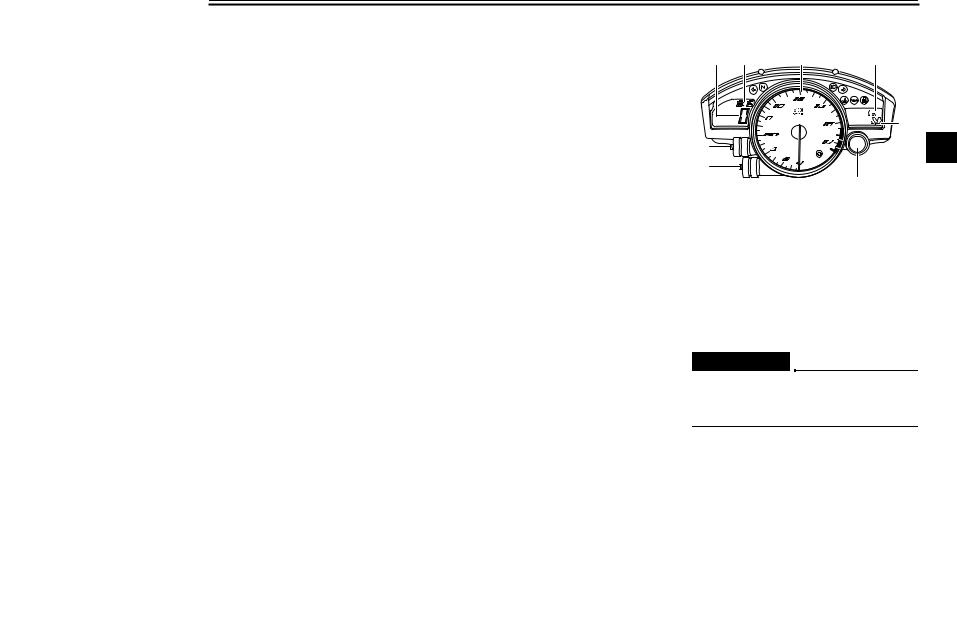
INSTRUMENT AND CONTROL FUNCTIONS
EAU42770
Engine trouble warning light “  ”
”
This warning light comes on when an electrical circuit monitoring the engine is defective. When this occurs, have a Yamaha dealer check the self-diagno- sis system. (See page 3-8 for an explanation of the self-diagnosis device.)
The electrical circuit of the warning light can be checked by turning the key to “ON”. If the warning light does not come on for a few seconds, then go off, have a Yamaha dealer check the electrical circuit.
EAU11571
Shift timing indicator light
This indicator light can be set to come on and go off at the desired engine speeds and is used to inform the rider when it is time to shift to the next higher gear.
The electrical circuit of the indicator light can be checked by turning the key to “ON”.
If the indicator light does not come on for a few seconds, then go off, have a Yamaha dealer check the electrical cir-
cuit. (See page 3-9 for a detailed explanation of the function of this indicator light and on how to set it.)
|
|
|
|
EAU39252 |
Multi-function meter unit |
||||
2 |
1 |
5 |
|
6 |
|
MPH |
|
|
|
|
|
|
TRIP A |
˚F |
|
|
|
|
|
|
|
|
|
7 |
3 |
|
|
|
3 |
4
8
1.Clock
2.Speedometer
3.“SELECT” button
4.“RESET” button
5.Tachometer
6.Coolant temperature display/air intake temperature display
7.Odometer/tripmeters/fuel reserve tripmeter/stopwatch
8.Shift timing indicator light
EWA12421
 WARNING
WARNING
Be sure to stop the vehicle before making any setting changes to the multi-function meter unit.
The multi-function meter unit is equipped with the following:
3-5
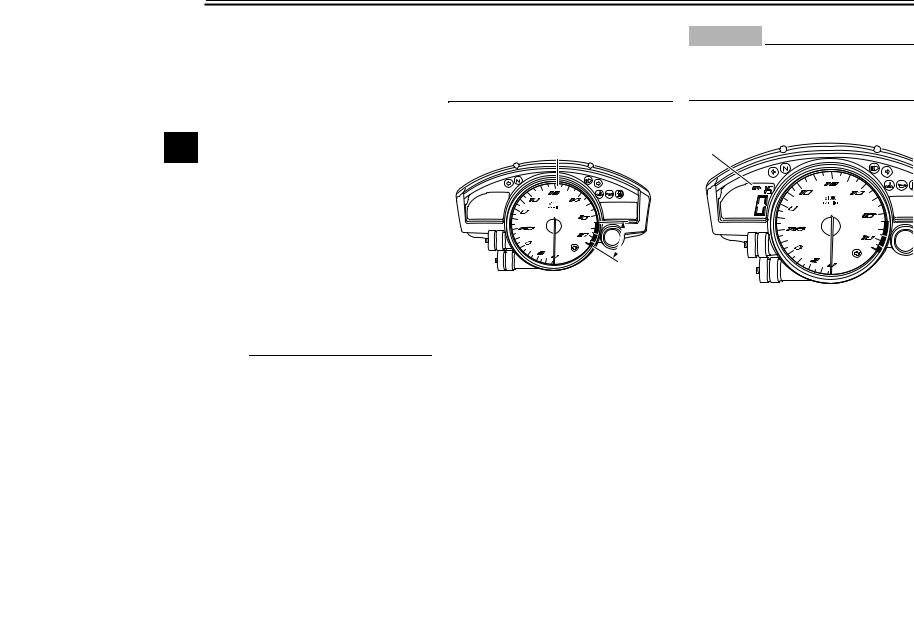
INSTRUMENT AND CONTROL FUNCTIONS
●a speedometer (which shows the riding speed)
●a tachometer (which shows engine speed)
●an odometer (which shows the total distance traveled)
●two tripmeters (which show the
distance traveled since they were
3last set to zero)
●a fuel reserve tripmeter (which shows the distance traveled since the fuel level warning light came on)
●a stopwatch
●a clock
●a coolant temperature display
●an air intake temperature display
●a self-diagnosis device
●a display brightness and shift timing indicator light control mode
NOTE:
●Be sure to turn the key to “ON” before using the “SELECT” and “RESET” buttons, except for setting the display brightness and shift timing indicator light control mode.
●To switch the speedometer and odometer/tripmeter displays between kilometers and miles, press the “SELECT” button for at least one second.
Tachometer
1
 2
2
1.Tachometer
2.Tachometer red zone
The electric tachometer allows the rider to monitor the engine speed and keep it within the ideal power range.
When the key is turned to “ON”, the tachometer needle will sweep once across the r/min range and then return to zero r/min in order to test the electrical circuit.
ECA10031
CAUTION:
Do not operate the engine in the tachometer red zone.
Red zone: 16500 r/min and above
Clock
1
MPH

TRIP A
1. Clock
To set the clock
1.Turn the key to “ON”.
2.Push the “SELECT” button and “RESET” button together for at least two seconds.
3.When the hour digits start flashing, push the “RESET” button to set the hours.
4.Push the “SELECT” button, and the minute digits will start flashing.
3-6
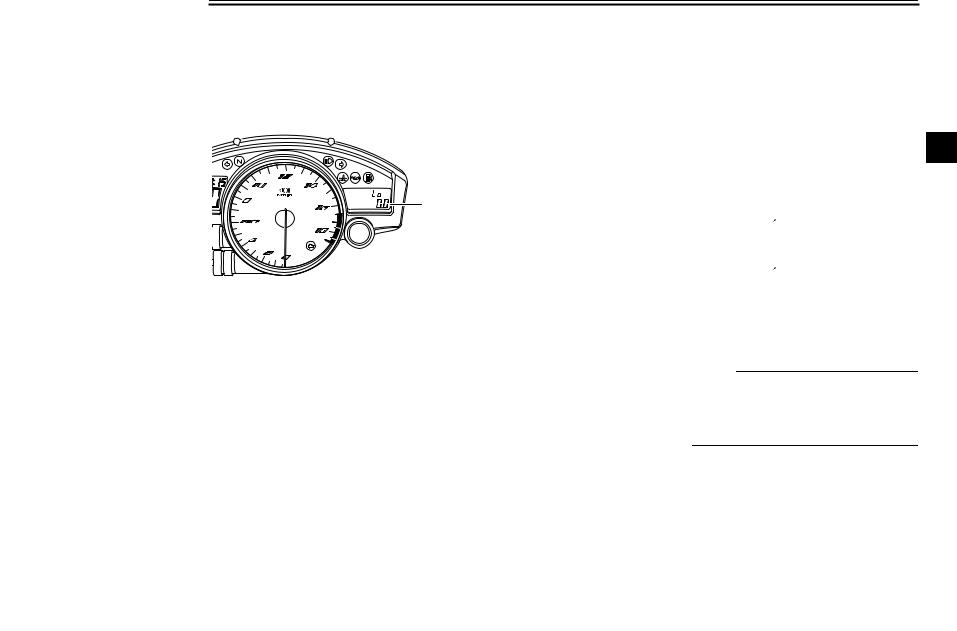
INSTRUMENT AND CONTROL FUNCTIONS
5.Push the “RESET” button to set the minutes.
6.Push the “SELECT” button and then release it to start the clock.
Odometer, tripmeter, and stopwatch modes
TRIP A |
˚F |
|
1
1.Odometer/tripmeters/fuel reserve tripmeter/stopwatch
Push the “SELECT” button to switch the display between the odometer mode “ODO”, the tripmeter modes “TRIP A” and “TRIP B” and the stopwatch mode in the following order:
TRIP A → TRIP B → ODO → Stopwatch → TRIP A
If the fuel level warning light comes on (see page 3-2), the odometer display will automatically change to the fuel re-
serve tripmeter mode “F-TRIP” and start counting the distance traveled from that point. In that case, push the “SELECT” button to switch the display between the various tripmeter, odometer, and stopwatch modes in the following order:
F-TRIP → Stopwatch → TRIP A → TRIP B → ODO → F-TRIP
To reset a tripmeter, select it by pushing the “SELECT” button, and then push the “RESET” button for at least one second. If you do not reset the fuel reserve tripmeter manually, it will reset itself automatically and the display will return to the prior mode after refueling and traveling 5 km (3 mi).
Stopwatch mode
To change the display to the stopwatch mode, select it by pushing the “SELECT” button. (The stopwatch digits will start flashing.) Release the “SELECT” button, and then push it again for a few seconds until the stopwatch digits stop flashing.
Standard measurement
1.Push the “RESET” button to start the stopwatch.
2.Push the “SELECT” button to stop the stopwatch.
3.Push the “SELECT” button again to reset the stopwatch.
Split-time measurement |
3 |
1.Push the “RESET” button to start the stopwatch.
2.Push the “RESET” button or start
switch “ ” to measure split-times. (The colon “:” will start flashing.)
” to measure split-times. (The colon “:” will start flashing.)
3.Push the “RESET” button or start
switch “ ” to display the final splittime or push the “SELECT” button to stop the stopwatch and display total elapsed time.
” to display the final splittime or push the “SELECT” button to stop the stopwatch and display total elapsed time.
4.Push the “SELECT” button to reset the stopwatch.
NOTE:
To change the display back to the prior mode, push the “SELECT” button for a few seconds until the stopwatch digits flash.
3-7
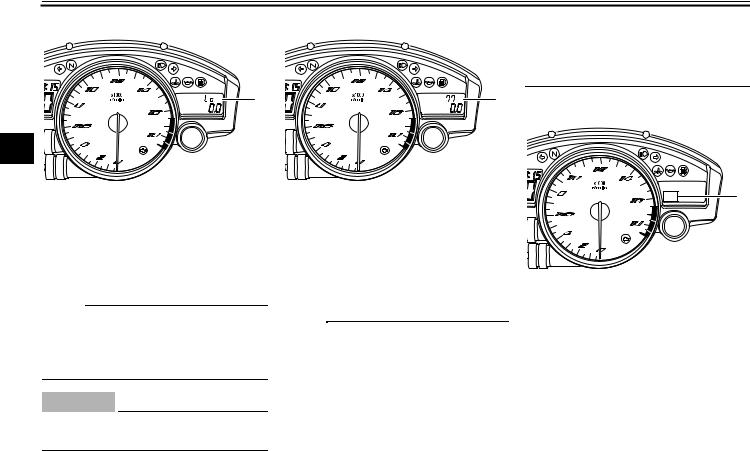
INSTRUMENT AND CONTROL FUNCTIONS
Coolant temperature display
TRIP A |
˚F |
1 |
|
||
|
|
3
1. Coolant temperature display
The coolant temperature display indicates the temperature of the coolant. Push the “RESET” button to switch the coolant temperature display to the air intake temperature display.
NOTE:
When the coolant temperature display is selected, “C” is displayed for one second, and then the coolant temperature is displayed.
ECA10020
CAUTION:
Do not operate the engine if it is overheated.
Air intake temperature display
TRIP A |
˚F |
1 |
|
||
|
|
1. Air intake temperature display
The air intake temperature display indicates the temperature of the air drawn into the air intake duct. Push the “RESET” button to switch the coolant temperature display to the air intake temperature display.
NOTE:
●Even if the air intake temperature is set to be displayed, the coolant temperature warning light comes on when the engine overheats.
●When the key is turned to “ON”, the coolant temperature is automatically displayed, even if the air intake temperature was displayed prior to turning the key to “OFF”.
●When the air intake temperature display is selected, “A” is displayed for one second, and then the air intake temperature is displayed.
Self-diagnosis device
1
1. Error code display
This model is equipped with a self-diag- nosis device for various electrical circuits.
If any of those circuits are defective, the engine trouble warning light will come on, and then the right display will indicate a two-digit error code.
If the right display indicates any error codes, note the code number, and then have a Yamaha dealer check the vehicle.
3-8
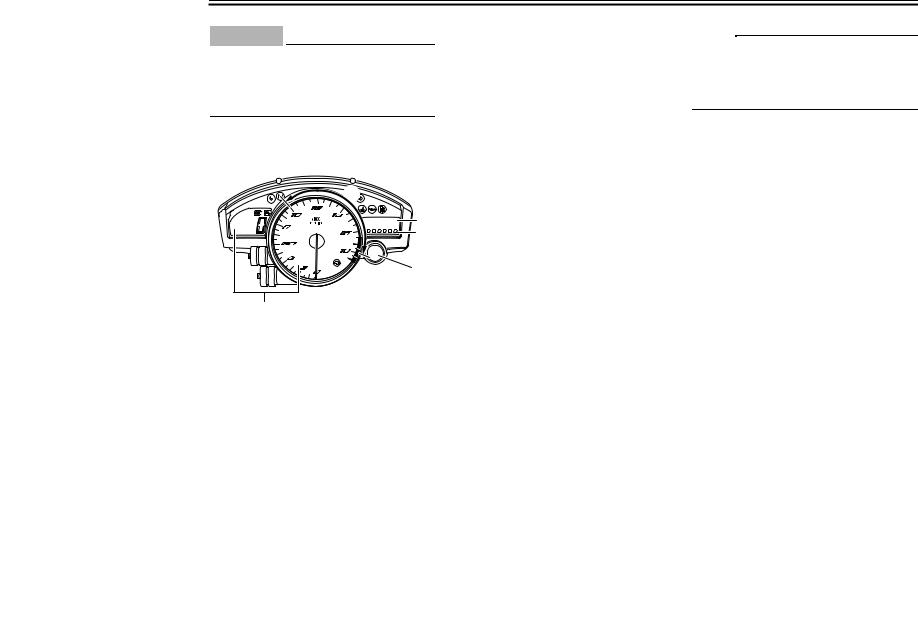
INSTRUMENT AND CONTROL FUNCTIONS
ECA11590
CAUTION:
If the display indicates an error code, the vehicle should be checked as soon as possible in order to avoid engine damage.
Display brightness and shift timing indicator light control mode
|
2 |
MPH |
1 |
|
|
|
4 |
|
3 |
|
1 |
1.Display brightness
2.Shift timing indicator light activation/deactivation
3.Shift timing indicator light
4.Brightness level
This mode cycles through five control functions, allowing you to make the following settings in the order listed below.
●Display brightness:
This function allows you to adjust the brightness of the displays and tachometer to suit the outside lighting conditions.
●Shift timing indicator light activity: This function allows you to choose whether or not the indicator light should be activated and whether it should flash or stay on when activated.
●Shift timing indicator light activation:
This function allows you to select the engine speed at which the indicator light will be activated.
●Shift timing indicator light deactivation:
This function allows you to select the engine speed at which the indicator light will be deactivated.
●Shift timing indicator light brightness:
This function allows you to adjust the brightness of the indicator light to suit your preference.
NOTE:
In this mode, the right display shows the current setting for each function (except the shift timing indicator light activity function).
To adjust the brightness of the multi- |
|
|
|
|
3 |
|
|
function meter displays and tachometer |
|
|
|
|
|
|
|
|
|
|
|
1.Turn the key to “OFF”.
2.Push and hold the “SELECT” button.
3.Turn the key to “ON”, and then release the “SELECT” button after five seconds.
4.Push the “RESET” button to select the desired brightness level.
5.Push the “SELECT” button to confirm the selected brightness level. The control mode changes to the shift timing indicator light activity function.
To set the shift timing indicator light activity function
1.Push the “RESET” button to select one of the following indicator light activity settings:
3-9
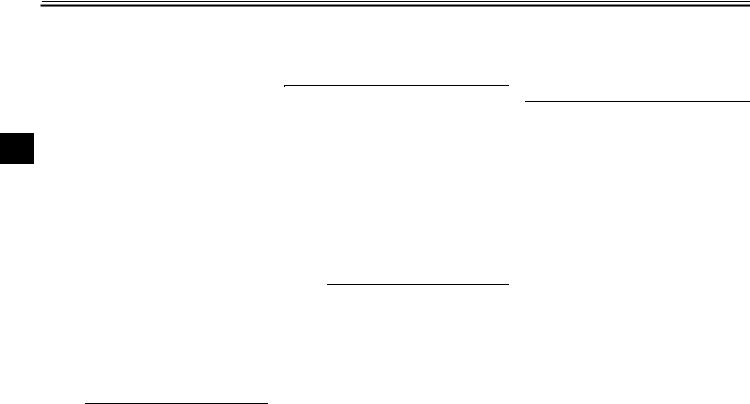
INSTRUMENT AND CONTROL FUNCTIONS
●The indicator light will stay on when activated. (This setting is selected when the indicator light stays on.)
●The indicator light will flash
when activated. (This setting is selected when the indicator light flashes four times per
3second.)
●The indicator light is deactivated; in other words, it will not come on or flash. (This setting is selected when the indicator light flashes once every two seconds.)
2.Push the “SELECT” button to confirm the selected indicator light activity. The control mode changes to the shift timing indicator light activation function.
To set the shift timing indicator light activation function
NOTE:
The shift timing indicator light activation function can be set between 10000 r/min and 18000 r/min. From 10000 r/min to 13000 r/min, the indicator light
can be set in increments of 500 r/min. From 13000 r/min to 18000 r/min, the indicator light can be set in increments of 200 r/min.
1.Push the “RESET” button to select the desired engine speed for activating the indicator light.
2.Push the “SELECT” button to confirm the selected engine speed. The control mode changes to the shift timing indicator light deactivation function.
To set the shift timing indicator light deactivation function
NOTE:
●The shift timing indicator light deactivation function can be set between 10000 r/min and 18000 r/min. From 10000 r/min to 13000 r/min, the indicator light can be set in increments of 500 r/min. From 13000 r/min to 18000 r/min, the indicator light can be set in increments of 200 r/min.
●Be sure to set the deactivation function to a higher engine speed than for the activation function, otherwise the shift timing indicator light will remain deactivated.
1.Push the “RESET” button to select the desired engine speed for deactivating the indicator light.
2.Push the “SELECT” button to confirm the selected engine speed. The control mode changes to the shift timing indicator light brightness function.
To adjust the shift timing indicator light brightness
1.Push the “RESET” button to select the desired indicator light brightness level.
2.Push the “SELECT” button to confirm the selected indicator light brightness level. The right display will return to the odometer or tripmeter mode.
3-10
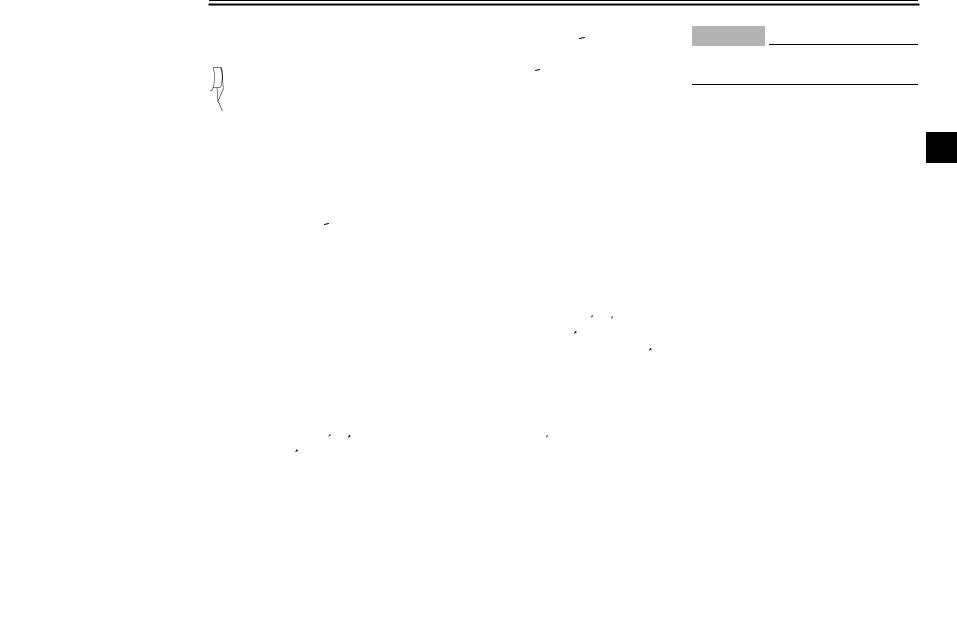
INSTRUMENT AND CONTROL FUNCTIONS
Handlebar switches
Left
1.Dimmer switch “  /
/ ”
”
2.Turn signal switch “ /
/  ”
”
3.Horn switch “  ”
”
Right
1.Engine stop switch “ /
/ ”
”
2.Start switch “ ”
”
EAU12347 |
EAU12400 |
Dimmer switch “ /
/ ”
”
Set this switch to “ ” for the high beam and to “
” for the high beam and to “ ” for the low beam.
” for the low beam.
EAU12460
Turn signal switch “ /
/ ”
”
To signal a right-hand turn, push this switch to “ ”. To signal a left-hand turn, push this switch to “
”. To signal a left-hand turn, push this switch to “ ”. When released, the switch returns to the center position. To cancel the turn signal lights, push the switch in after it has returned to the center position.
”. When released, the switch returns to the center position. To cancel the turn signal lights, push the switch in after it has returned to the center position.
EAU12500
Horn switch “  ”
”
Press this switch to sound the horn.
EAU12660
Engine stop switch “ /
/ ”
”
Set this switch to “ ” before starting the engine. Set this switch to “
” before starting the engine. Set this switch to “ ” to stop the engine in case of an emergency, such as when the vehicle overturns or when the throttle cable is stuck.
” to stop the engine in case of an emergency, such as when the vehicle overturns or when the throttle cable is stuck.
EAU12710
Start switch “ ”
”
Push this switch to crank the engine with the starter.
ECA10050
CAUTION:
See page 5-1 for starting instructions prior to starting the engine.
EAU41700
The engine trouble warning light will come on when the key is turned to “ON” and the start switch is pushed, but this 3 does not indicate a malfunction.
3-11

INSTRUMENT AND CONTROL FUNCTIONS
Clutch lever |
EAU12820 |
EAU12870 |
EAU33851 |
Shift pedal |
|
Brake lever |
3
1. Clutch lever
The clutch lever is located at the left handlebar grip. To disengage the clutch, pull the lever toward the handlebar grip. To engage the clutch, release the lever. The lever should be pulled rapidly and released slowly for smooth clutch operation.
The clutch lever is equipped with a clutch switch, which is part of the ignition circuit cut-off system. (See page 3-24.)
1. Shift pedal
The shift pedal is located on the left side of the engine and is used in combination with the clutch lever when shifting the gears of the 6-speed con- stant-mesh transmission equipped on this motorcycle.
1.Brake lever
2.“ ” mark
” mark
3.Brake lever position adjusting knob
4.Distance between brake lever and handlebar grip
The brake lever is located at the right handlebar grip. To apply the front brake, pull the lever toward the handlebar grip.
The brake lever is equipped with a brake lever position adjusting knob. To adjust the distance between the brake lever and the handlebar grip, turn the adjusting knob while holding the lever pushed away from the handlebar grip. When the desired position is obtained,
3-12
